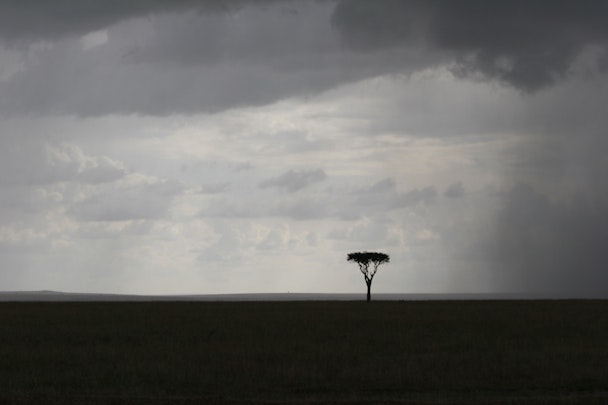What can the advertising industry do about loneliness?
Loneliness won’t be an alien topic to many of us after two years of lockdowns, remote work and staring at computer screens. But loneliness and being physically isolated are two different things. As the dust has settled on a hybrid world, loneliness hasn’t disappeared but mutated. With loneliness the topic for this week’s Mental Health Awareness Week in the UK, we checked in with five adlanders from The Drum Network about the shape of the problem and what we can do.

Members of The Drum Network on loneliness in 2022 – and what the industry can do about it / Randy Fath via Unsplash
Jack Weight, project manager (and mental health first aider), Receptional
We know that lockdowns caused a spike in loneliness. But people are experiencing a different type of loneliness now we’re returning to the workplace. The Beatles described it in Eleanor Rigby: “Wearing the face that she keeps in a jar by the door.”
Many people feel like they have to be someone else when they walk into the office. They worry about being too much, too noisy, too quiet. They feel like they have to wear a mask. These people only truly feel like themselves once they’re home, in their own space again. That leads to real loneliness in the workplace.
We need to do three things. First, create cultures where people can unapologetically be themselves. Education is hugely important. Colleagues need to understand each other through things such as personality and motivational mapping.
Next, train leaders and managers to effectively communicate and truly listen so that everyone feels heard, understood and safe to be themselves.
Finally, create open channels of communication between everyone. That helps us know how each person works and how we react to certain situations, reducing friction and increasing cohesion.
Subashini Nadarajah, global executive director of equity, inclusion and belonging, VMLY&R
Mental health has become an integral part of diversity, equity, inclusion and belonging. Research indicates that investing in workplace mental health results in increased productivity and improved employee retention, as well as an average of four times ROI.
At the start of the Covid-19 pandemic, with lockdowns and the great uncertainty they brought, at VMLY&R we focused on active engagement and support programs, providing our people with a platform to voice and discuss their experiences, worries and day-to-day struggles all over the world. We recruited expert guidance to provide tools and mindset framing to support mental health and other coping mechanisms in monthly regional webinars.
We also introduced Wellbeing, our mental health employee group. Wellbeing is our physical, mental, emotional and spiritual health; enabling us to fully participate in our lives and experience meaningful connections. Our wellbeing is inextricably linked to how we show up for our colleagues, partners and clients.
There’s much more work to be done in the mental health space. Our people mean the world to us. I believe we’re on the right path moving forward collectively because we are listening and joining hands and hearts to support each other in this human crisis.
Neil Pawley, principal consultant, Foolproof
Many in our industry have suffered loneliness over the last couple of years. Agencies are frenetic at the best of times. Many colleagues love this environment, with daily exposure to a creative buzz, which feeds their instincts and allows them to bounce ideas off others. The removal of this will have hit many hard.
But it’s not like that for everyone. My autism means I don’t relish a busy and hectic environment. I don’t want noise or distraction, and if I want advice or to try out ideas it has to be at a time of my choosing in a dynamic that I can control. Maybe this isn’t quite the said thing, but the last two years have been ideal for me. I’ve been at my most productive and creative while working from home in an environment tailor-made for me, choosing engagement with others rather than having it thrust upon me.
I can’t imagine what it has been like for many. That’s one of the things with autism – insufficient data for assessment, and a lack of understanding another person’s thoughts, makes this kind of thing a blind spot for me.
Jess Hodgson, group operations director, TIPi Group
Loneliness is the feeling of isolation. It would be remiss to think that, in the ‘new normal’ with more time face-to-face, there aren’t residual feelings of loneliness and social anxiety remaining with us after the whiplash of the last two years.
As an industry, we need to be mindful of digging a little deeper with our colleagues to understand how feelings on social interaction have shifted. Many people, including myself, who were advertising extroverts, have begun to struggle with the adjustment back to the pace that our industry expects both in the office and socially.
I’m having to continually remind myself not to say ‘yes’ to everything purely because we didn’t have the option to say yes for so long. Being comfortable enough to say ‘no’ without feeling that we’re letting people down or missing out is vital. Being aware of this and accepting that each person is different, with many of us having adjusted to the pandemic, will prevent creating feelings of social isolation from our friends and colleagues.
Lauren du Mont, head of client services, Paradise
When thinking about loneliness, I don’t think of the physical act of being alone, but more the mental state of feeling alone while being surrounded by people.
The first step is to be able to identify loneliness and understand why you’re feeling it. There are many reasons why you might feel lonely while at work, from financial worries to the pressure of targets and deadlines or office culture.
We at Paradise are tackling this by forming a Culture Club built up of people from across departments. Its main goal is to ensure an environment that makes our people feel included and empowered while at the studio.
Emily-Faye Duncan, head of people and culture, Rufus Leonard
We all feel lonely sometimes, but when a brief sensation becomes prolonged it affects our mental health. Often people struggling with loneliness are convinced nobody feels the same way, which erodes their confidence and makes changing the way they feel incredibly difficult.
Much focus during the pandemic was on loneliness among the elderly, but loneliness can happen in your twenties, in a relationship or in a busy household. We’re human beings and social creatures; we all need to feel connected, loved and wanted.
Mental health shouldn’t be taboo. While we’ve done great work on breaking the stigma, there’s more to done. We need to continue having difficult conversations to learn from each other.
Leaders have a responsibility to their teams and our community, to lead by example and have conversations around mental health. Letting people know you’re there to listen speaks volumes. It doesn’t take a leadership course to be able to listen to someone, or show empathy and compassion.
Amplifying mental health issues by starting or joining conversations gives strength to tackle the stigma.
Content created with:

Receptional
Founded in 1999, just a year after Google, Receptional is an award-winning agency that's remained at the forefront of digital marketing for over 20 years.
A...

VML
VML is a leading creative company that combines brand experience, customer experience, and commerce, creating connected brands to drive growth. VML is celebrated...
Find out more
Foolproof
We are specialists in experience design. We create value for you by creating value for your customers.
Design know‑how
Use our talent and experience...

TIPi Group
TIPi Group is an award winning network of specialist digital agencies. Our agencies are built on performance and profitability and share an ambition to use the power...
Find out more
Rufus Leonard
Rufus Leonard is an independent agency who builds category-defining service brands through design & technology. We act as the catalyst for service brands with...
Find out more
Paradise
Paradise London is an independent fully-integrated creative agency dedicated to enhancing, connecting and refining brands worldwide.
Find out more
